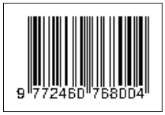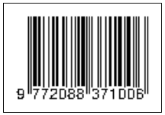Analisis Hasil Proses Pemampatan JPEG dengan Metode Discrete Cosine Transform
Adi Prasetio Utomo(1*), Agfianto Eko Putra(2), Catur Atmaji(3)
(1)
(2)
(3)
(*) Corresponding Author
Abstract
Abstrak
JPEG merupakan standar kompresi digital yang dikembangkan oleh Group Joints Photograpic Experts yang menggunakan kombinasi DCT dan pengkodean Huffman untuk mengkompresi suatu citra digital.[1]. Pemampatan JPEG merupakan algoritme pemampatan secara lossy. [2]. JPEG bekerja dengan mengubah gambar spasial dan merepresentasikan ke dalam pemetaan frekuensi. Salah satu metode dalam pemampatan JPEG yang dapat digunakan adalah metode DCT (Discrete Cosine Transform), dengan memisahkan antara informasi frekuensi yang rendah dan tinggi dari sebuah gambar.[3]
File yang digunakan adalah gambar grayscale dengan format bitmap, memiliki ukuran 26,422 bytes, resolusi 176x144 piksel. Gambar diproses sesuai standar pemampatan JPEG, dianalisis hasil pemampatan berdasarkan variasi yang dilakukan pada tahapan block image transformation dan DCT quantization. Pengukuran kualitas gambar hasil pemampatan dilakukan secara subjektif melalui pandangan visual mata manusia dan secara objektif dengan parameter nilai PSNR dan rasio pemampatan
Dari penelitian dapat disimpulkan bahwa nilai PSNR dan rasio pemampatan gambar dapat digunakan sebagai parameter untuk mengukur kualitas gambar dan dapat diketahui penggunaan macroblock serta nilai step kuantisasi yang tepat untuk mendapatkan hasil optimal dalam pemampatan gambar grayscale.
Kata kunci—JPEG,DCT,pemampatan JPEG, gamabr grauscale, PSNR, rasio pemampatan
Abstract
JPEG is a digital compression standard developed by the Group of Experts Photograpic Joints using a combination of DCT and Huffman coding to compress a digital image.[1]. JPEG compression is a lossy compression algorithm. [2]. JPEG works by converting the spatial images and to represent frequency mapping.One of the methods in JPEG compression that can be used is a DCT method (Discrete Cosine Transform), with a separate low frequency information and high of an image. High frequency information will be selected to be eliminated which related to image compression and measurement quality of the image.[3]
Files used are grayscale images with a bitmap format, has a size of 26.422 bytes, 176x144 pixel resolution. Image processed according to standard JPEG compression, the compression results are analyzed based on variations performed on block image transformationandquantization. Measurement of quality of image compression is done subjectively through visual view of the human eye and objectively with the parameter value of PSNR and compression ratio.
From the study it can be concluded that the value of PSNR and compression ratio of an image can be used as a parameter to measure the image quality and can be detected using macroblock and value of quantization step which the right to obtain optimal results in compression of grayscale images
Keywords—JPEG, DCT, JPEG compression, grayscale images, PSNR, compression ratio
Full Text:
PDFArticle Metrics
Refbacks
- There are currently no refbacks.
Copyright (c) 2017 IJEIS - Indonesian Journal of Electronics and Instrumentation Systems

This work is licensed under a Creative Commons Attribution-ShareAlike 4.0 International License.
View My Stats1







